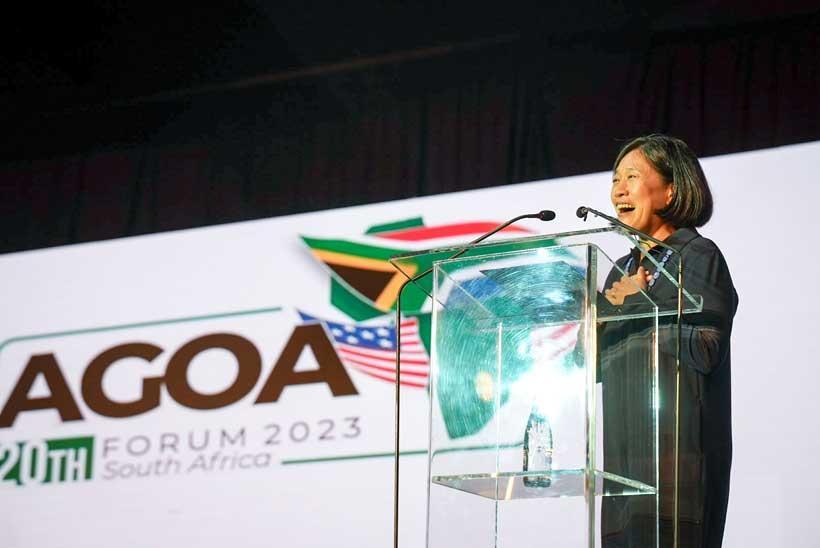By
Kester Kenn Klomegah
Africa-Press – Lesotho. The overarching message is African leaders and business corporate executives, navigating new United States economic policy and trade measures, within the context of shifting geopolitical situation, have to maintain an appreciable approach on ways to strengthen strategic trade partnership between Africa and the United States.
The African Growth and Opportunity Act (AGOA), enacted on 18th May 2000, provides eligible sub-Saharan African countries with duty-free access to the U.S. market, due to expire in September 2025. The duty-free access for nearly 40 African countries has boosted development, fostered more equitable and sustainable growth in Africa.
By design AGOA is a useful mechanism for improving accessibility to trade competitiveness, connectivity, and productivity. During these past 25 years, AGOA has been the cornerstone of U. S. economic engagement with the countries of sub-Saharan Africa.
In this critical time, particularly under President Donald Trump, highly demands African leaders and business corporate executives to hold focused-discussions on the status of bilateral trade and economic cooperation, science and technology, and on the prospects for its expansion and extension of AGOA, recognizing its significance to Africa during these past several years.
While expressing the weaknesses of the global economic system and multilateral financial organizations, Africa has to maintain confidence and work with mutual understanding, and with joint efforts to build a more equitable multipolar world.
Engaging in tectonic criticisms and other forms of coercive measures are unacceptable, as this position would rather inflict an irreparable damage to U.S. -African relations. In this case, Africa emerges as the key loser, and further means cutting off huge revenues from trade headwinds back to Africa’s economy.
Over the past few years, African leaders have been advocating for large-scale structural reforms, financial inadequacies and policy approach by multinational institutions mostly dominated by the United States.
Despite the increasing level of discontentment, disaffection and dissatisfaction over relations with the United States, Africa has tremendously benefited in diverse ways.
United States, comparably the best for environment for Africans, nearly African leaders are western trained and U. S. -educated, while millions constitute simply the unbreakable bridge between the United States and Africa.
Notwithstanding Africa’s huge untapped resources, Africa still looks to United States, multinational financial institutions to savage its economy. Arguable though, United States serves as a safe-heaven for African politicians and entrepreneurs.
The resonating widely-acknowledged fact is the AGOA has created investment opportunities and new markets for American businesses. In addition, it has formed the bedrock of America’s economic partnership with African countries.
As one of the strategic steps, AGOA is closely working with the African Continental Free Trade Area (AfCFTA) Secretariat, and with the African Union (AU).
It has also established working relationships with regional economic organizations in the continent. In the final analysis, these efforts aim at fortifying AGOA and U. S. –Africa trade and investment cooperation in the coming years.
Besides the indelible benefits of the African Growth and Opportunity Act (AGOA), some African strategists and research analysts indisputably believe that financial remittance flow is definitely one of the surest reliable sources of foreign exchange, depending solely on the dollar currency, to support trade.
In its latest report released in June 2024, the World Bank indicated that, despite the geopolitical uncertainties, instability and challenges, sub-Saharan Africa’s remittance flow reached US$54 billion in 2023. According to World Bank Statistics, remittance inflows to sub-Saharan Africa stood at US$49 billion in 2021.
Over the years, African leaders have been engaging with their diaspora, especially those excelling in the academia, business, science, technology, engineering, sports and other fields that the continent needs to optimize its diverse potentials and to meet development priorities.
These professionals primarily leverage into various sectors, act as bridges between the United States and Africa. Beyond remittances, Africa stands to benefit largely from the input of its diaspora considered as progressive in the United States.
Looking ahead for ensuring the trade between the United States and Africa, therefore requires reviewing measures such as trade policy, trade facilitation, productive capacity, trade-related infrastructure, trade finance, trade information and factor-market integration.
In conclusion, the United States has the largest African-origin and African-American population. Over the past 25 years, AGOA has made a tangible difference for millions of people in Africa.
New jobs. New business opportunities. New hope. AGOA has not only strengthened economic relations with the United States, but also has helped create African-led solutions to the region’s challenges.
Worth to note that African partners have to share the vision for a more sustainable, durable trade policies that can drive economic growth, open employment opportunities, increase industrialization.
And United States, as a genuine African partner, considering better treatment of the African Diaspora. It is just important to reiterate that AGOA is positively seen as an integral, inseparable feature in the U. S. -Africa relations. It is therefore necessary, – African leaders, the U. S. government, both U. S.
and African trade agencies and the private sector, civil society and stakeholders, – to combine the African Growth and Opportunity Act (AGOA) and the Africa Continental Free Trade Agreement (AfCFTA) as the cornerstone in strengthening the economic partnership with Africa, and for crafting AU Agenda 2063.
moderndiplomacy
For More News And Analysis About Lesotho Follow Africa-Press






